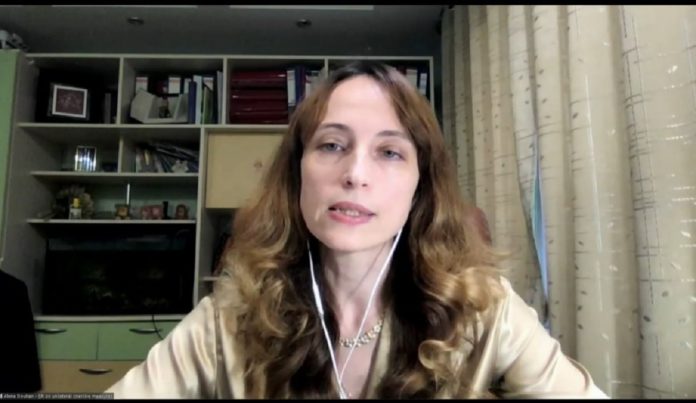
United Nations special rapporteur, Alena Douhan, during her speech at the 48th session of the UN Human Rights Council. Photo courtesy of RedRadioVE.

Orinoco Tribune – News and opinion pieces about Venezuela and beyond
From Venezuela and made by Venezuelan Chavistas

United Nations special rapporteur, Alena Douhan, during her speech at the 48th session of the UN Human Rights Council. Photo courtesy of RedRadioVE.
The special rapporteur of the United Nations (UN), Alena Douhan, confirmed on Wednesday, September 15, that illegal sanctions and blockades imposed against Venezuela have had a devastating effect on the population.
In a report presented at the 48th session of the UN Human Rights Council, Douhan explained that the sanctions imposed against Venezuela do not correspond to the requirements of international law.
In that sense, she detailed with figures, studies, and examples, how the different measures imposed by the United States and its allies in relation to the Venezuelan oil, gold, and mining sectors, the economic blockade and the freezing of assets of the Central Bank of Venezuela, have made the economic situation of the country difficult.
Reporte de las Medidas Coercitivas Unilaterales, Relatora Especial Alena Douhan https://t.co/2FJWzChNGQ
— Cancillería Venezuela 🇻🇪 (@CancilleriaVE) September 15, 2021
Douhan pointed out that the application of “sanctions” and blockades in different sectors exacerbated any pre-existing economic and humanitarian situations, in addition to preventing more income to be generated for use in social support programs.
“This has had a devastating effect on the entire population of Venezuela,” said the UN rapporteur.
She also recalled that foreign partners, banks, and companies have not wanted to do business with Venezuela for fear of sanctions.
Regarding the pandemic, she indicated that the coercive measures have made it impossible to acquire vital equipment to deal with COVID-19, and that have also affected the gas, electricity, and water services, and communications systems.
“The average salary in the public sector covers less than 2% of the basic food basket, which makes people dependent on social assistance or leads them to leave the country,” she explained.
#GRAVE👉:"El R. Especial lamenta que un acuerdo entre el Gob y el PNUD para descongelar los activos del BCV en el Banco de Inglaterra para que el PNUD compre medicamentos, kits de protección y vacunas no ha sido respaldado por el oposición política, bloqueando así la transacción" pic.twitter.com/egzI5ccRdI
— Organización Sures (@SuresDDHH) September 15, 2021
Douhan warned that this situation leads to the violation of health rights, which has been seen with the increase in maternal and infant mortality rates.
Finally, the Human Rights Rapporteur called on UN nations to negotiate and establish a resolution by the Human Rights Council that defines unilateral coercive measures, in order to prevents any interpretation of the term that is too broad, or misuse of the term.
Chancellor Plasencia agrees
Venezuelan Foreign Affairs Minister, Félix Plasencia, stated that the report of the United Nations special rapporteur, Alena Douhan, makes it clear that the unilateral coercive measures represent a collective punishment that has flagrantly violated international law, and that the economic blockade represents an “international crime that threatens the Venezuelan people, their economic and social rights, and their development.”
Comparto la intervención que acabamos de realizar en el marco de la 48ª sesión ordinaria del Consejo de Derechos Humanos de la ONU, sobre las Medidas Coercitivas Unilaterales contra nuestro país que, denunciamos, constituyen crímenes de lesa humanidad https://t.co/RzjKqANwjY
— Felix Plasencia (@plasenciafelixr) September 15, 2021
Plasencia referred to the most recent report by the Special Rapporteur on the negative impact of unilateral coercive measures on human rights, in which Douhan denounced the violation of international law by the United States and its allies, by imposing unilateral coercive measures.
Featured image: United Nations special rapporteur, Alena Douhan, during her speech at the 48th session of the UN Human Rights Council. Photo courtesy of RedRadioVE.
(RedRadioVE) by Ana Perdigón, with Orinoco Tribune content
Translation: Orinoco Tribune
OT/JRE/SL